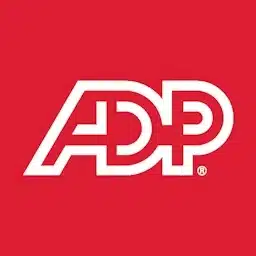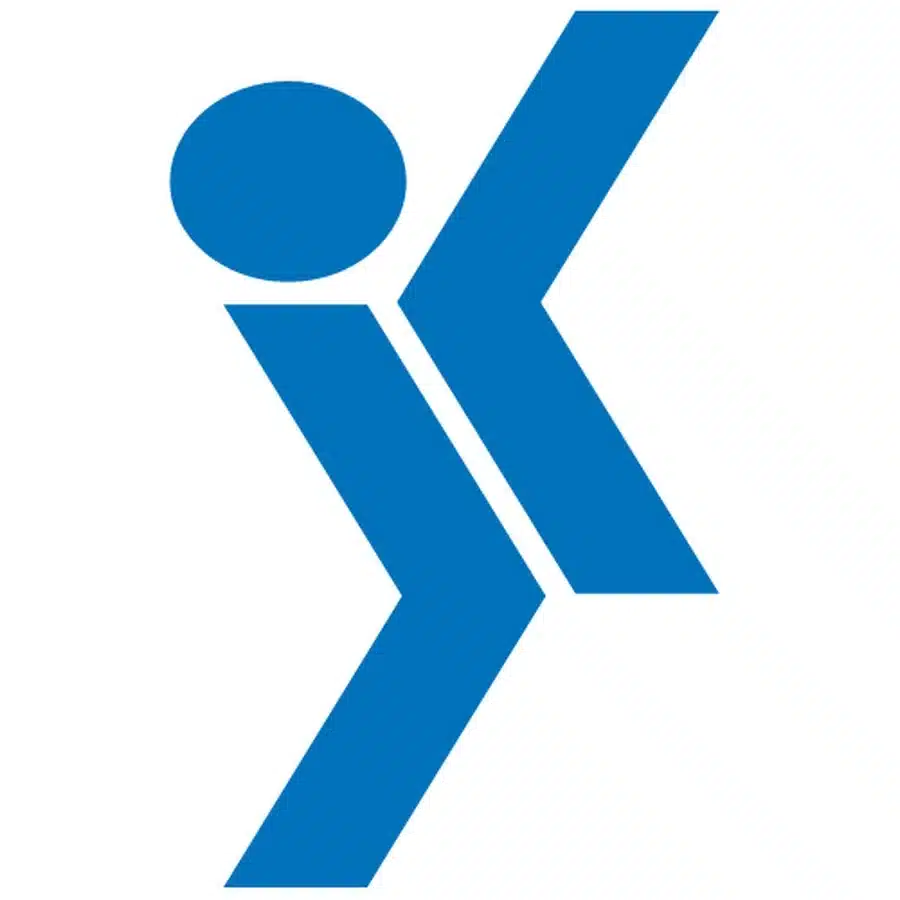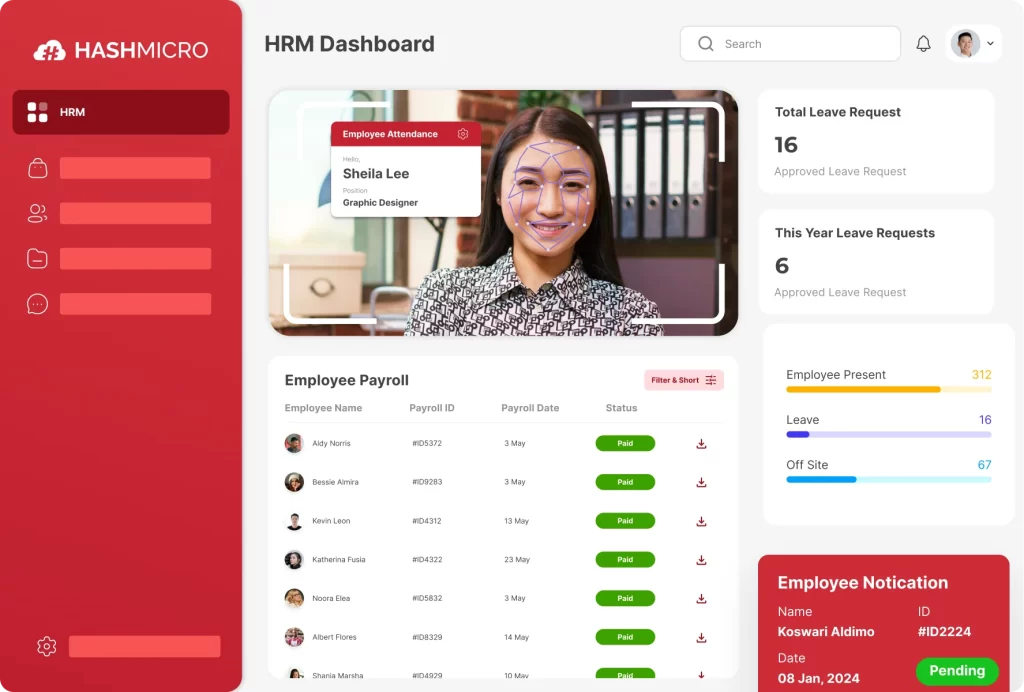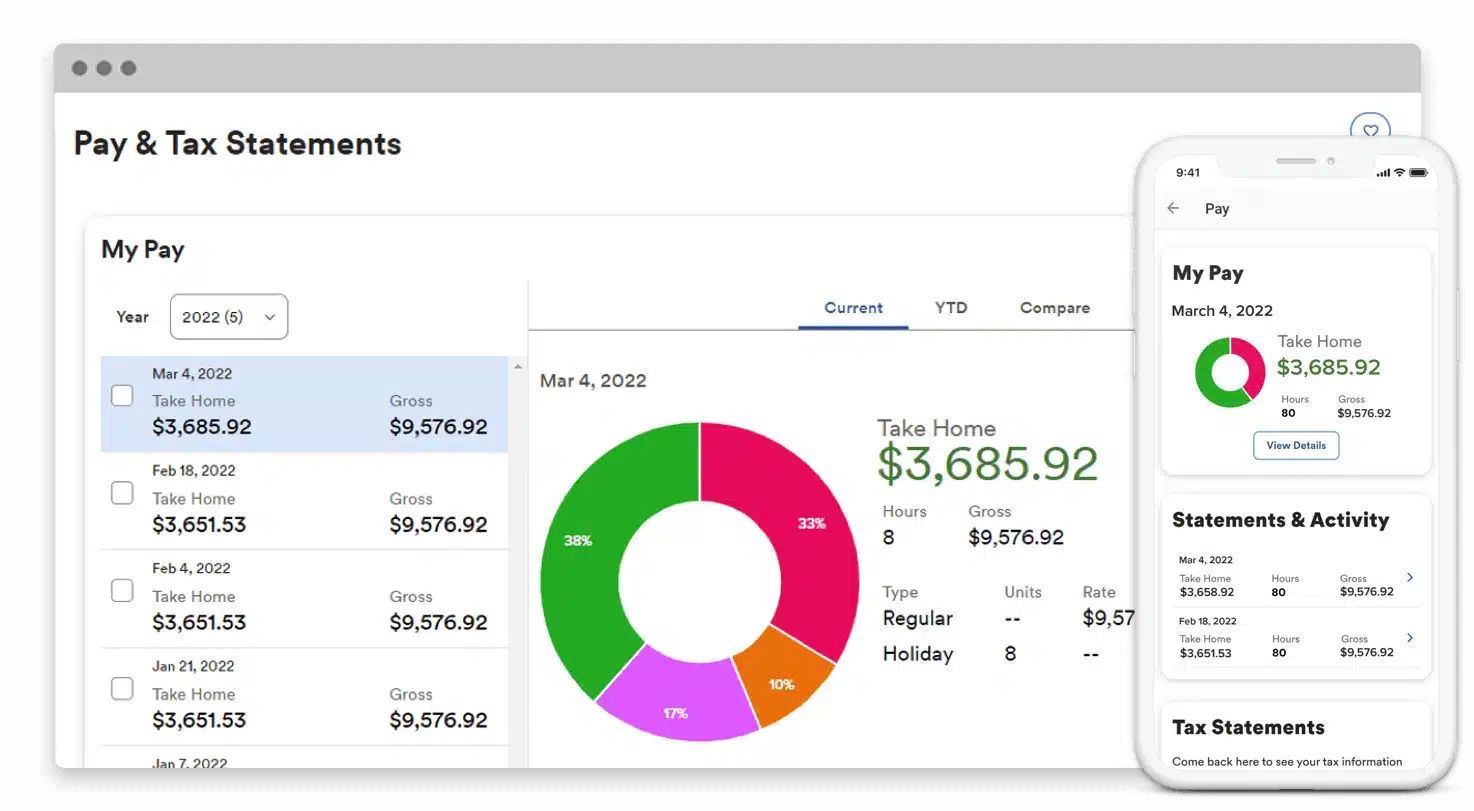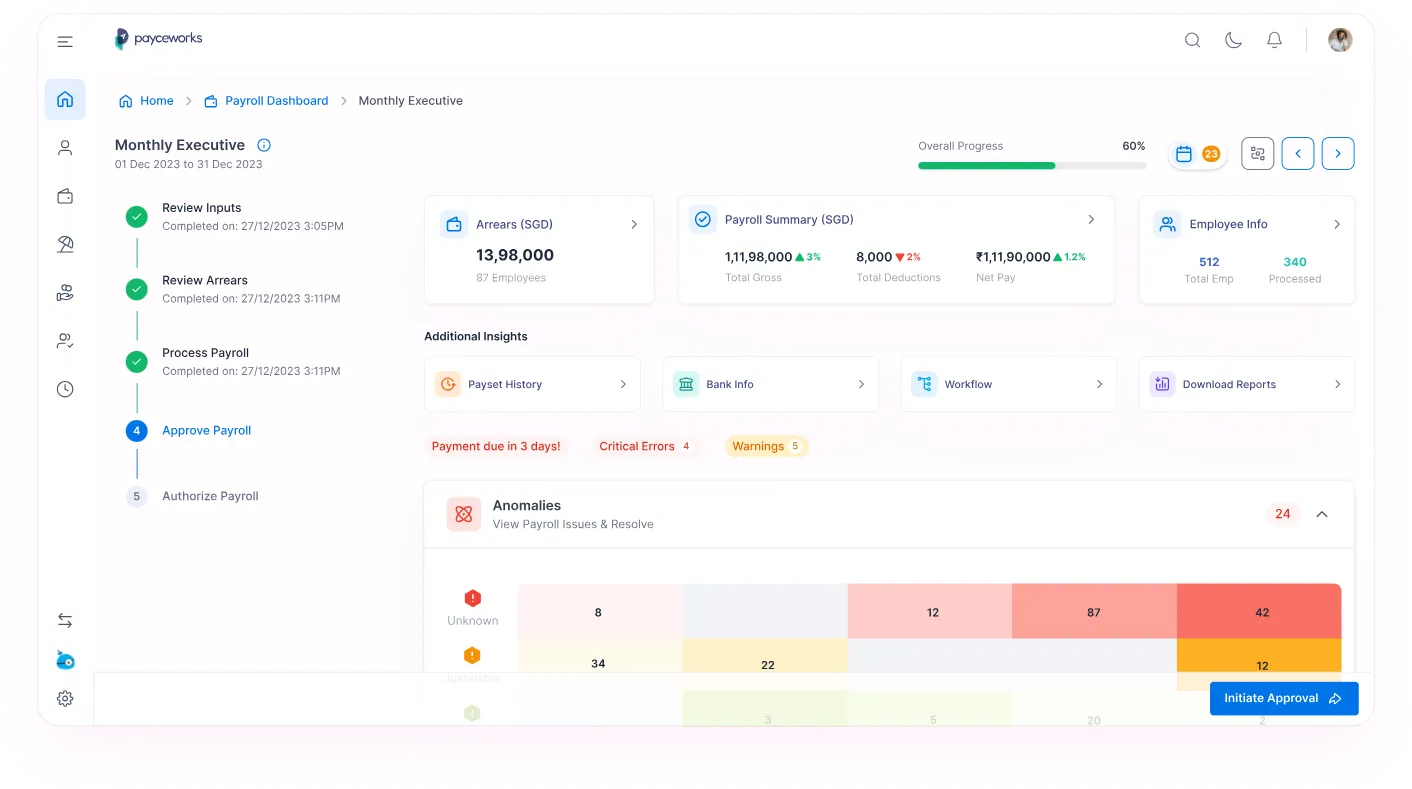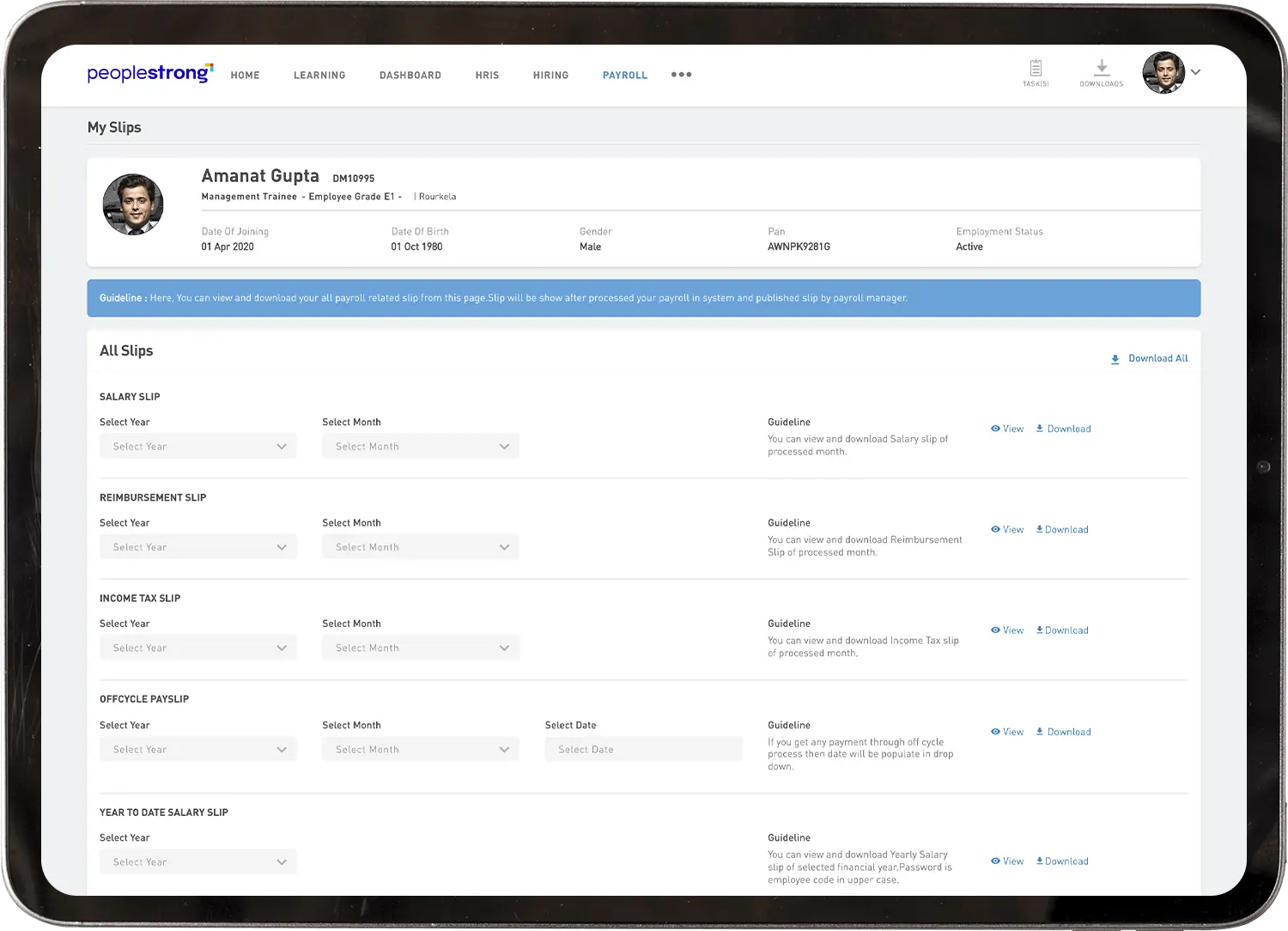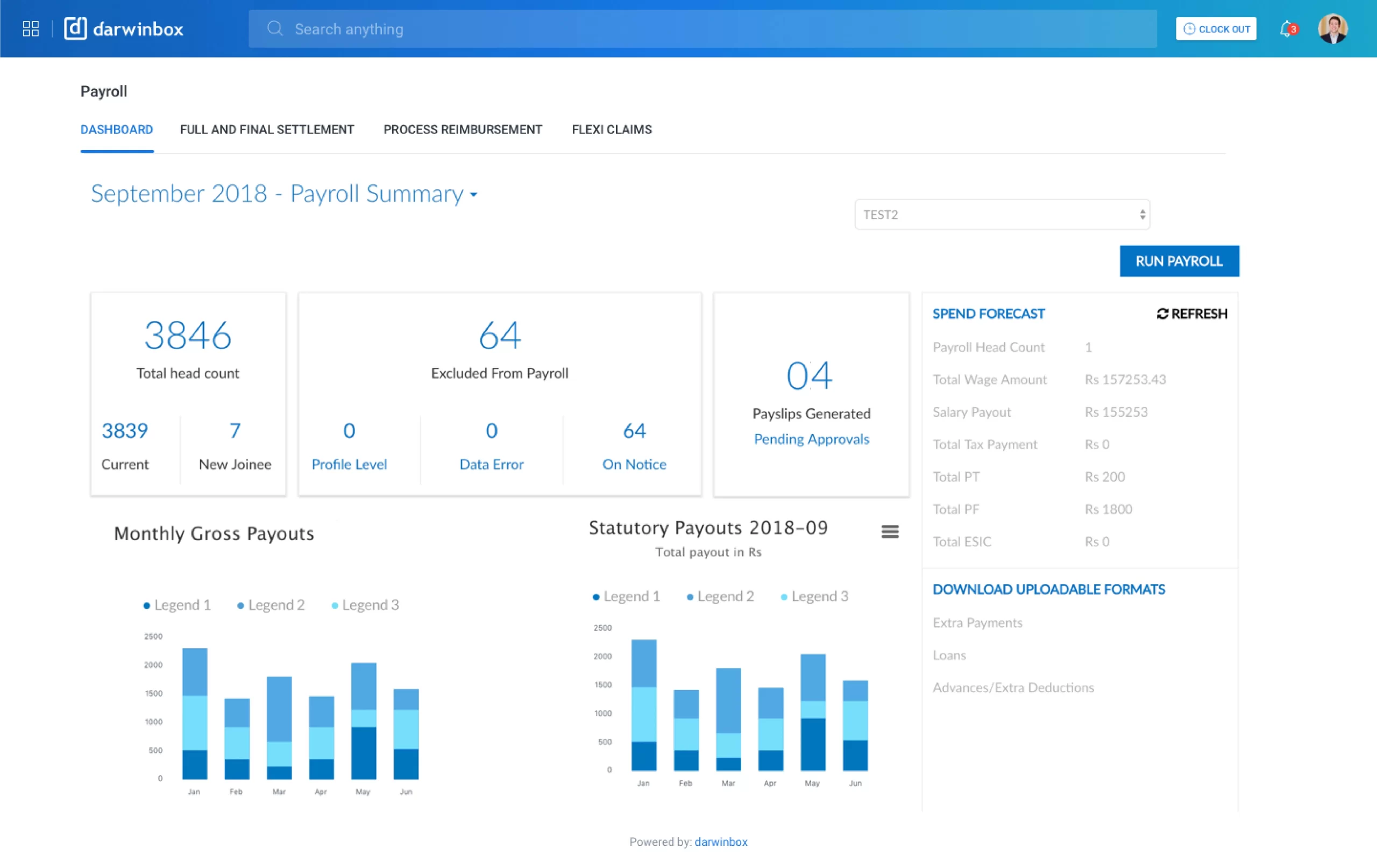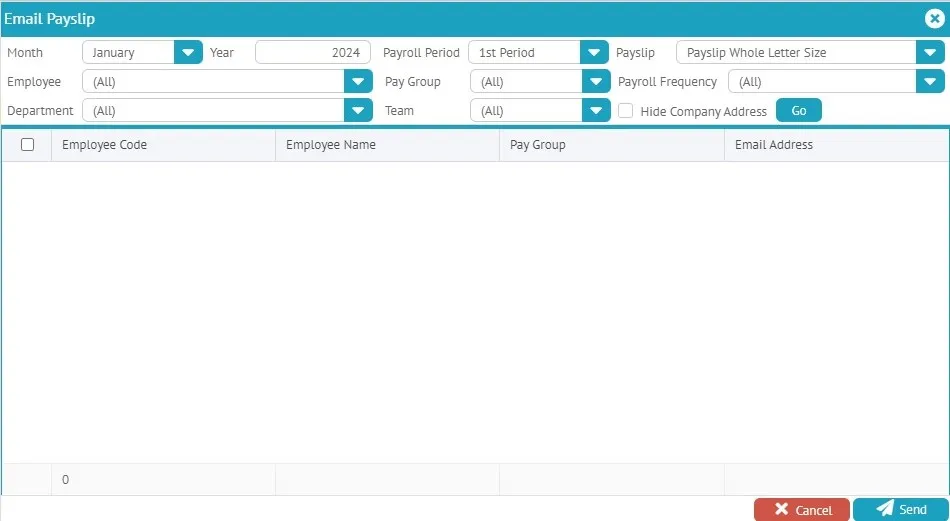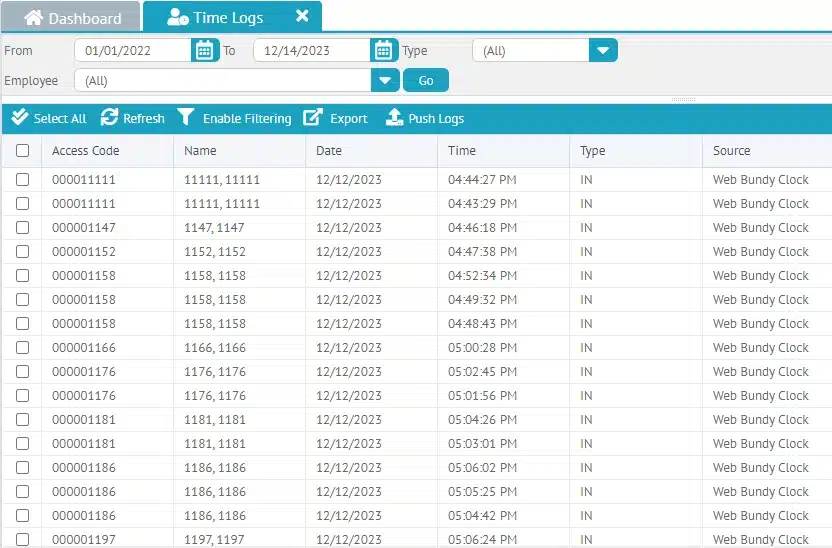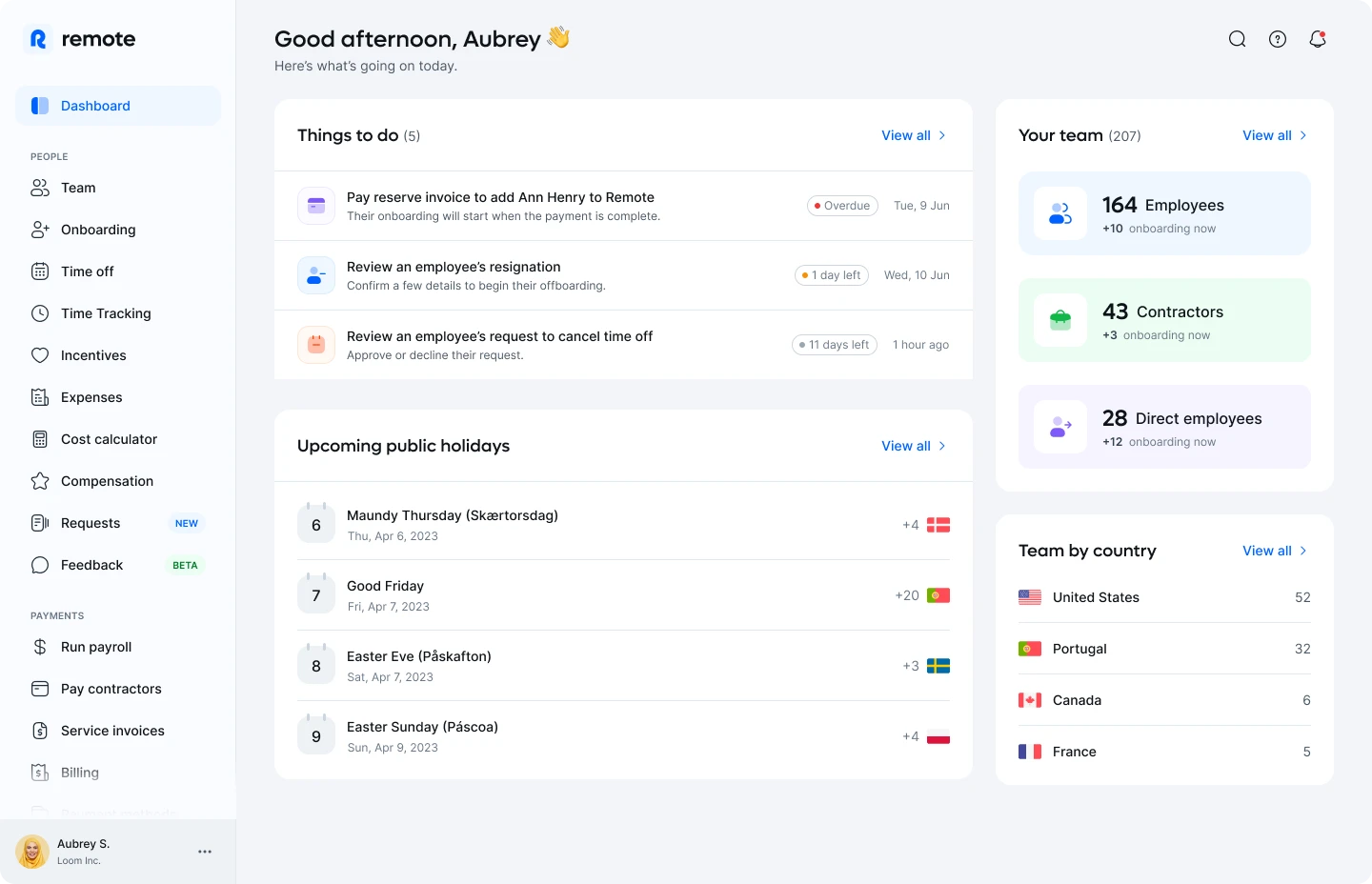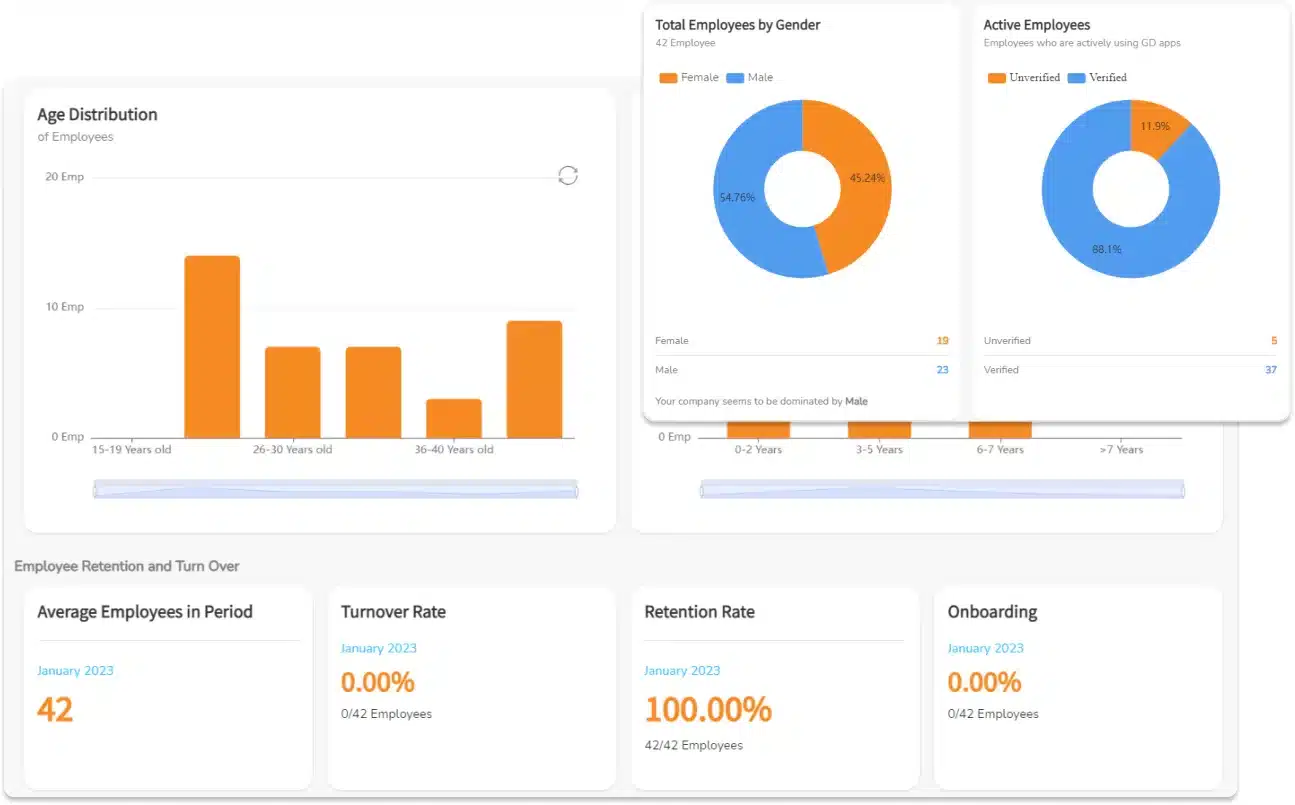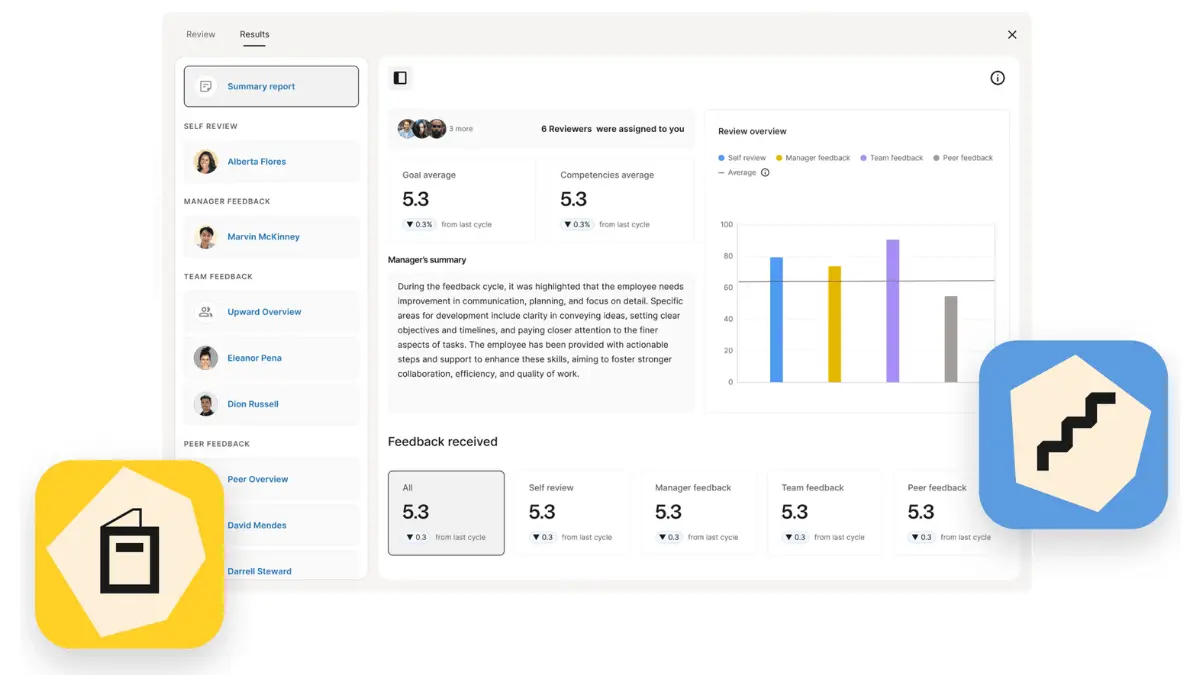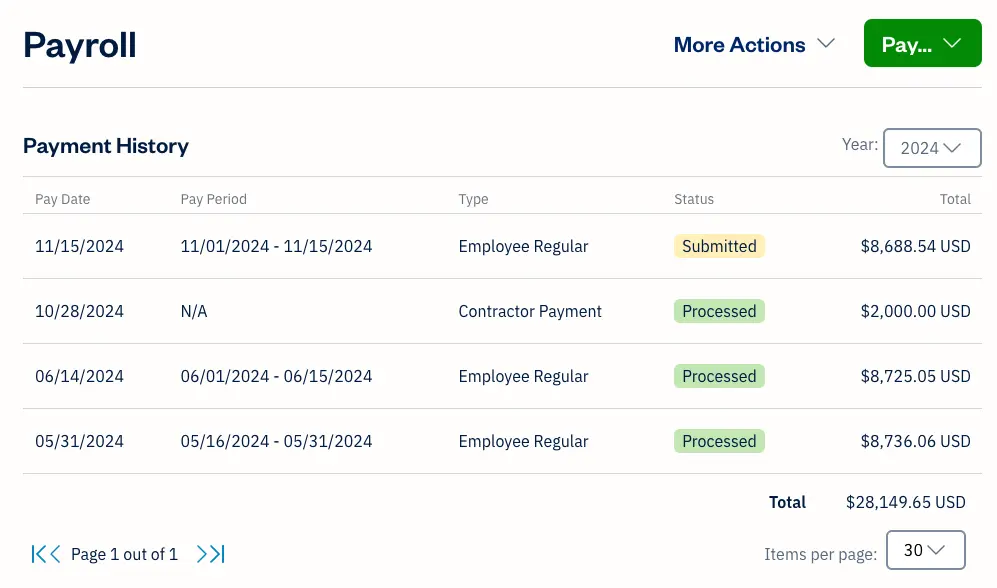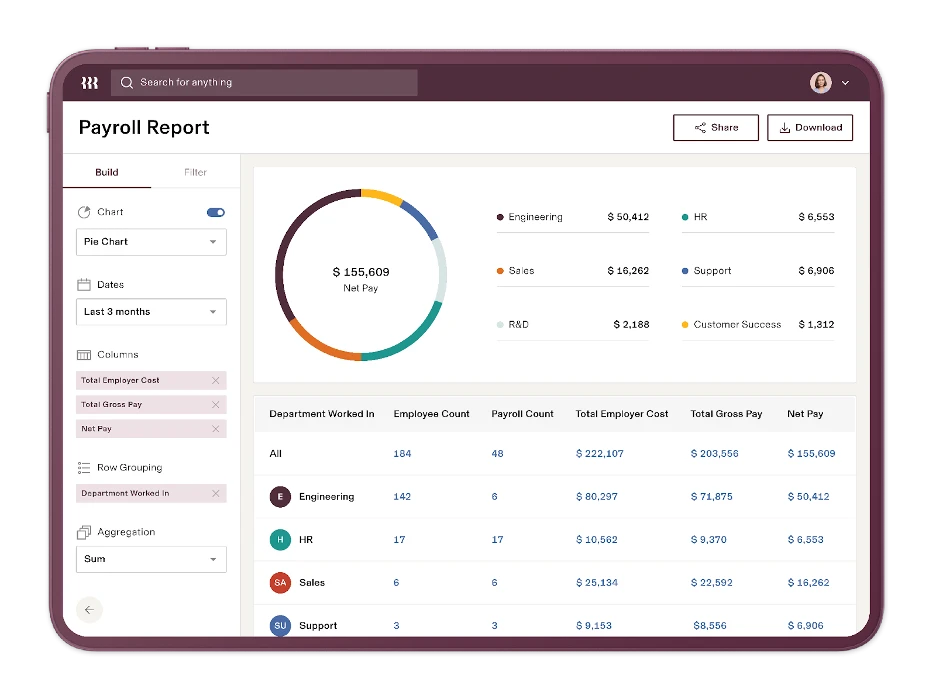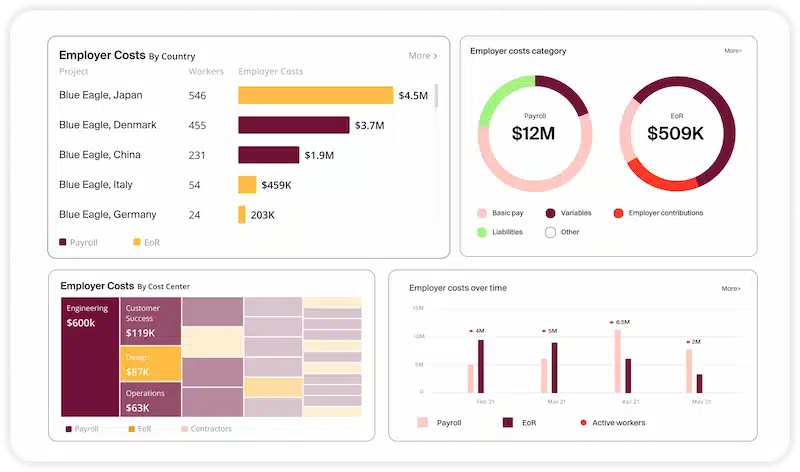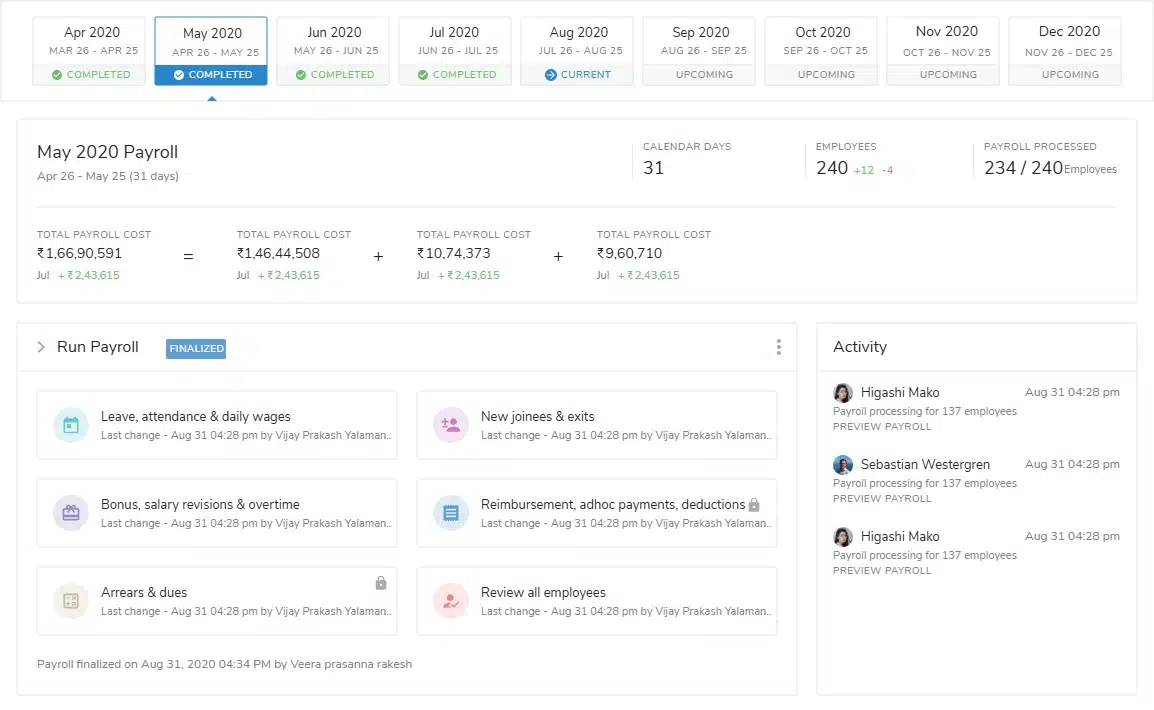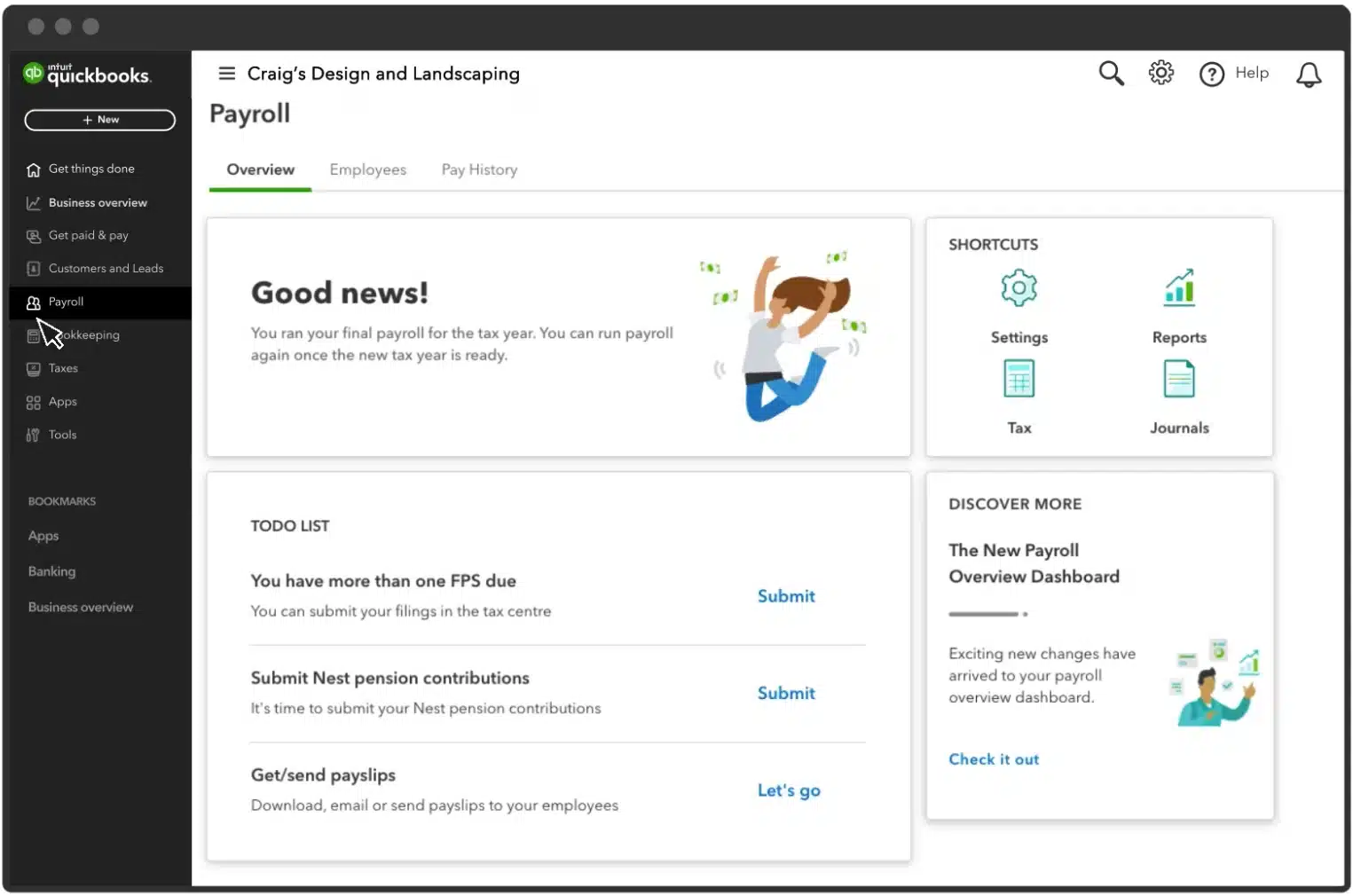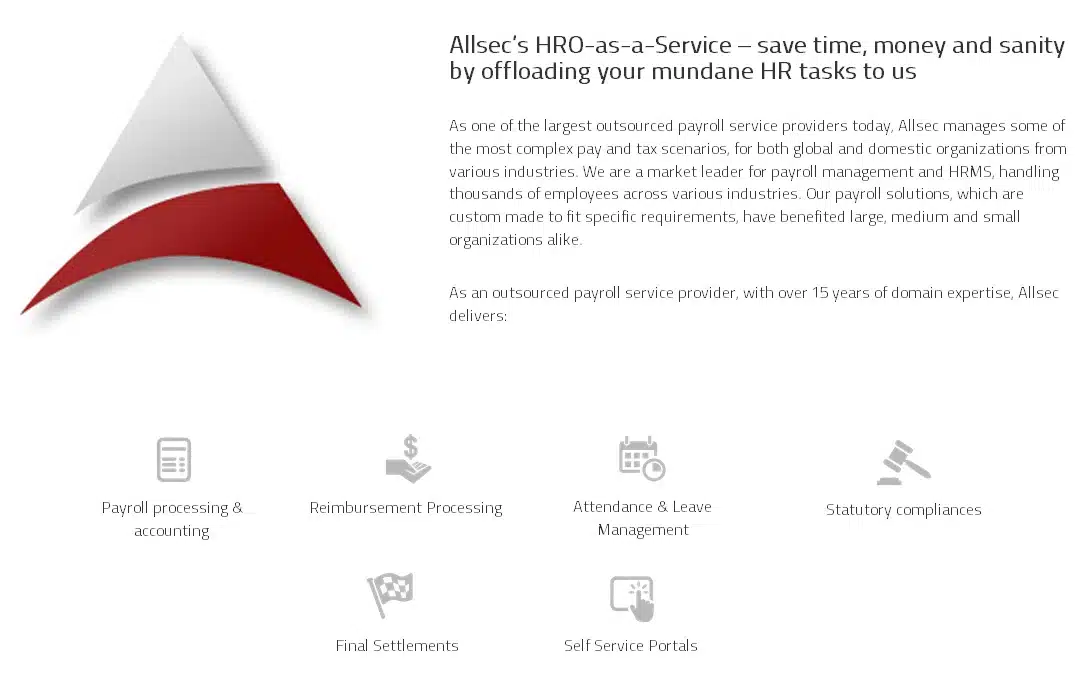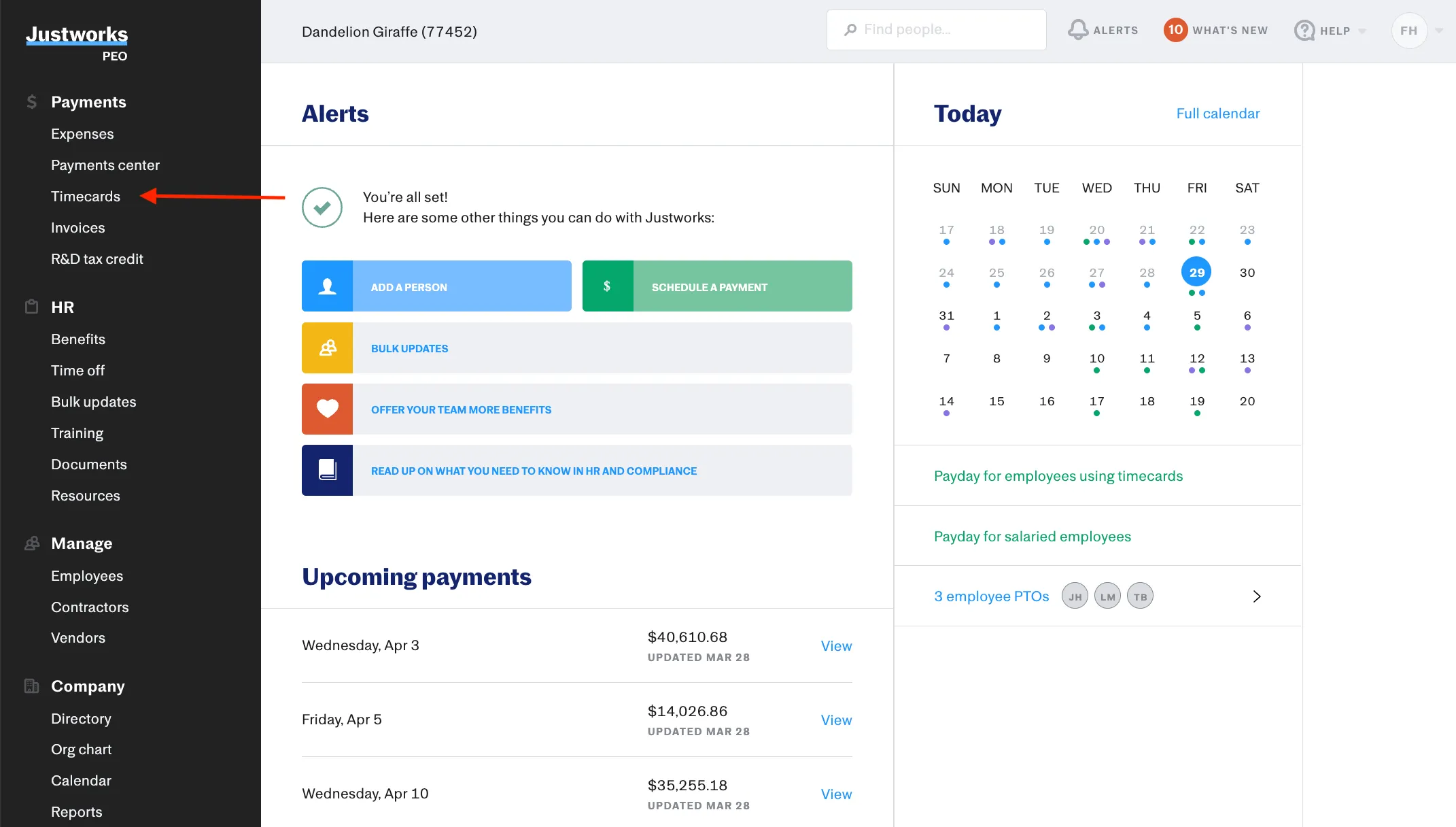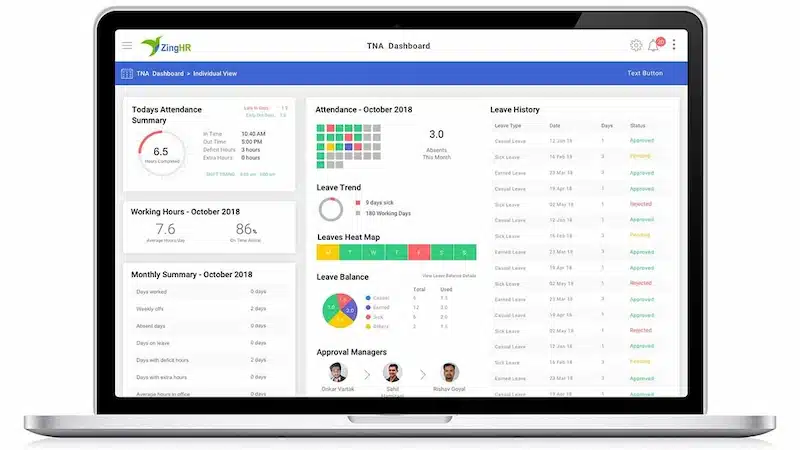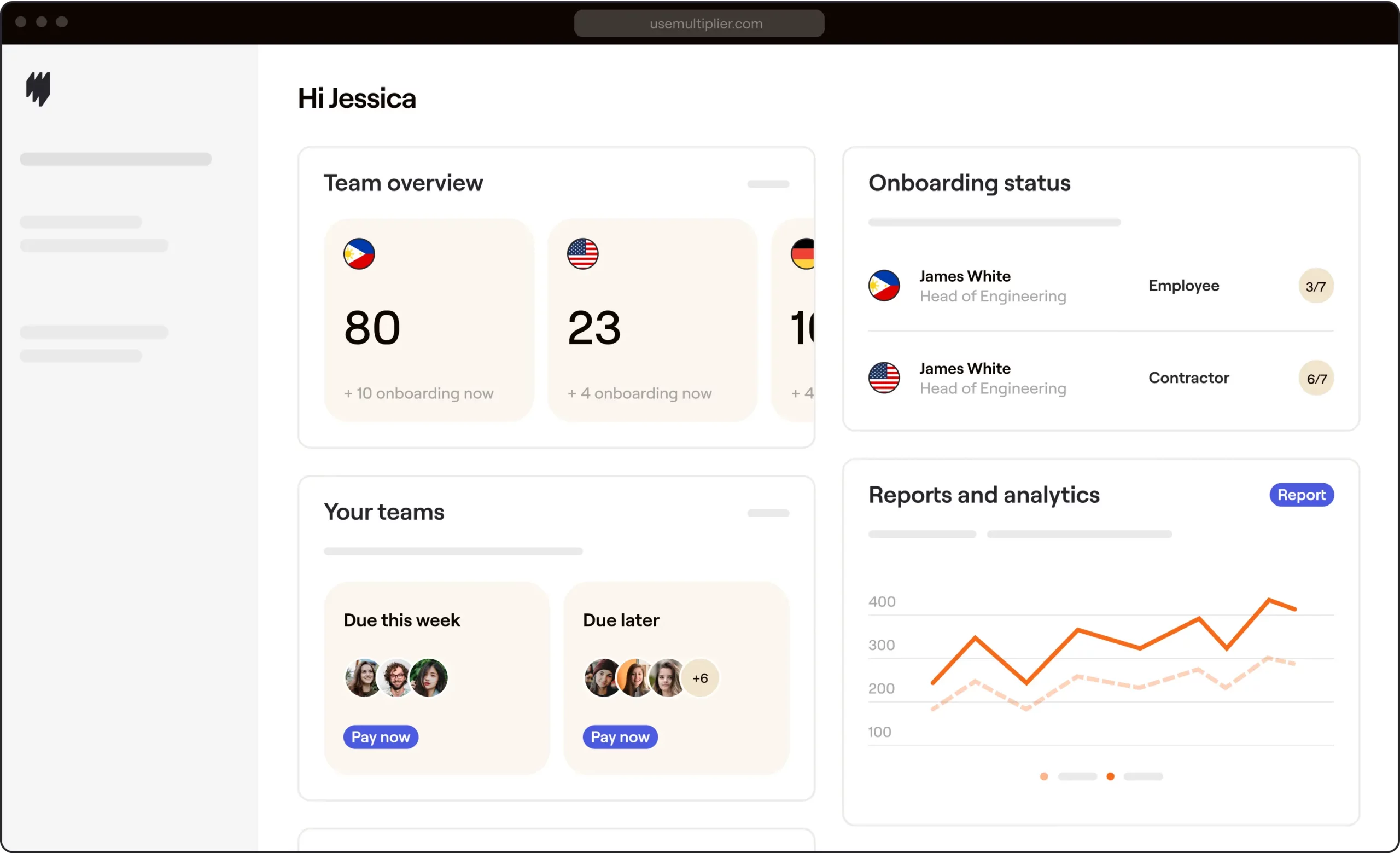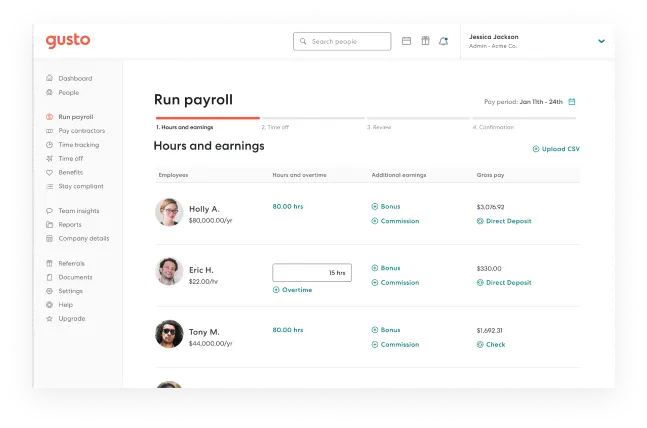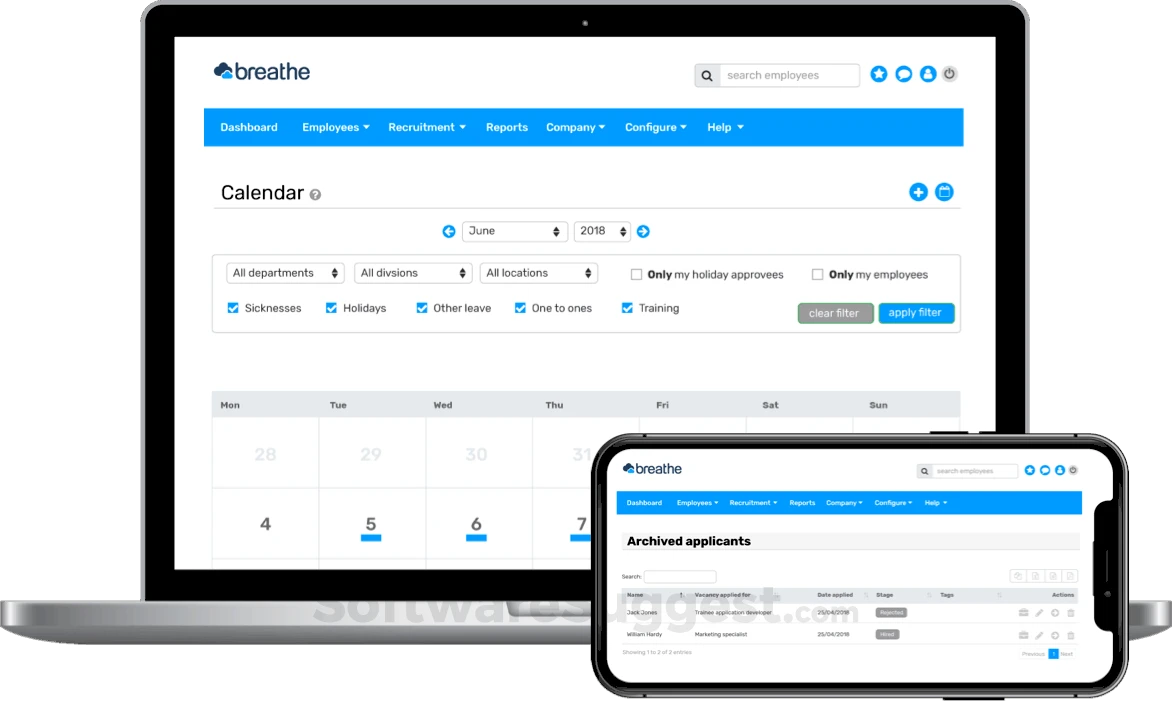
Have you ever experienced payroll delays, miscalculated 13th-month pay, or last-minute corrections to BIR, SSS, and PhilHealth reports? These issues are common when payroll is done manually, especially as your team grows. Payroll software helps automate salary calculations, contributions, and compliance so you can avoid costly errors and missed cutoffs.
According to Future Market Insights, the global payroll and HR solutions market is expected to grow from USD 32.1 billion in 2025 to USD 65.9 billion by 2035. This rapid expansion shows how businesses worldwide are adopting automated systems to improve payroll accuracy and efficiency.
With so many payroll options in the Philippines, choosing the right one can be challenging. HashMicro Payroll Software Philippines offers BIR-CAS readiness, automated payroll, and complete tracking tools, plus you can request a free demo. To guide your decision, we’ve also curated the 22 Best Payroll Software in the Philippines 2026.

Key Takeaways
|
Table of Contents
Best Payroll System Philippines at a Glance
Best Because The best end-to-end solution for all types of business needs
Best Because
Best for cloud payroll with built-in government updates.
Best Because
Best for large enterprises with global payroll needs.
Best Because
Best for multi-country payroll and complex compliance.
Best Because
Best for mobile-friendly and flexible payroll processing.
Best Because
Best for real-time payroll with attendance integration.
Best Because
Best for on-premise payroll built for local operations.
Best Because
Best for multi-country payroll and complex compliance.
Best Because
For businesses needing flexible payroll with integrated financial management.
Best Because
For small to midsize firms across accounting, finance, hospitality, construction, and trucking.
What is Payroll Software?
Payroll software is a digital tool that automates the process of managing employee compensation. It calculates salaries, deductions, taxes, and benefits while generating accurate payslips for every pay cycle. By replacing manual spreadsheets and reducing human error, payroll software ensures employees are paid correctly and on time, helping businesses maintain compliance with labor and tax regulations.
Beyond payment processing, payroll software also helps businesses manage employee data, attendance, and leave records in one system. Many modern solutions, such as HashMicro Payroll Software Philippines, integrate with accounting and HR modules to provide a seamless workflow—from attendance tracking to final payroll disbursement—helping companies save time, minimize errors, and maintain compliance with Philippine labor laws.
The Function of Payroll Software
Payroll software plays a critical role in ensuring that every payroll process runs accurately, consistently, and in full compliance with regulations. To understand its full value, it’s important to look at how its core functions operate within an integrated system.
- Recordkeeping: Keeps employee payroll and tax data securely organized and easily accessible for every pay period.
- Payment processing: Distributes wages via direct deposit or check, ensuring timely, accurate payouts.
- Tax management: Applies required tax calculations, withholdings, and submissions in accordance with the latest regulations.
- Compliance: Supports adherence to labor and tax laws by automating updates and compliance checks.
- Wage and deduction calculation: Computes net pay by factoring in hours worked, salaries, benefits, and all necessary deductions.
- Reporting: Provides comprehensive payroll, tax, and HR-related reports to support financial oversight and decision-making.
What are the Benefits of Using Payroll Software?
Here are the key benefits of using the best payroll software in the Philippines to enhance your payroll management:
- Improve efficiency and accuracy: Saves time and effort by automating payroll, reducing errors, and ensuring timely, accurate employee payments.
- Regulatory compliance: Keeps up to date with tax laws and regulations, reducing the risk of penalties for non-compliance.
- Data safety: It offers secure storage and handling of sensitive employee financial information.
- Cost-control: This lowers payroll processing costs by reducing the need for a large payroll department.
- Payroll Transparency: Often includes employee portals that let workers view their pay slips and tax information and request time off, enhancing transparency and communication.
Payroll system software is valuable for businesses seeking to optimize payroll processes, improve accuracy, ensure compliance, and deliver a better employee experience.
Need to know!
Payroll headaches? Let AI handle it! Hashy AI automates salary calculations, tax deductions, and payslips. Ensuring error-free payroll every time. Pay smarter, not harder!

Get a Free Demo Now!
22 Best Payroll Software in the Philippines 2026
Looking for the perfect payroll system software? We’ve rounded up the 22 Best Payroll Software in the Philippines for 2026, handpicked for their power to simplify payroll, reduce errors, and keep your business running smoothly.
1. HashMicro Payroll Software Philippines
HashMicro Payroll Software Philippines offers the best solution tailored for Philippine businesses, supporting automated salary calculation, BIR compliance, SSS/PhilHealth/Pag-IBIG deduction, and payslip generation. It also integrates fully with HRM and accounting modules for seamless workflows, and trusted by more than 2,000 businesses in Southeast Asia.
With unlimited user access, advanced scheduling tools, and role-based approvals, HashMicro is the best payroll system for mid-sized to large companies managing multi-branch payrolls. HashMicro also offers a free demo and expert consultation to help clients optimize payroll processing.
Key features:
- Custom payslip management for daily and hourly employees
- Automatic overtime calculation and inclusion in payroll
- Built-in professional templates with full customization options
- Fully localized tax calculation for SSS, PhilHealth, Pag-IBIG
- Delegated payroll approval with automated follow-up notifications
- Employee self-service for payroll access, leave requests, and profile updates
- Mobile applications for all employees to access payslips
- Automated reporting with detailed breakdowns for HR and compliance
| Pros | Cons |
|
|
Ideal user: HashMicro Payroll Software Philippines is suitable for Philippine firms seeking an all-in-one payroll management solution and can cover end-to-end business processes. This payroll software is also fully compliant to the Tax Reform for Acceleration and Inclusion (TRAIN) Law Philippines.

Pricing: The pricing scheme below provides detailed insight into your business’s needs. This vendor also offers transparent pricing and upfront costs, so you don’t need to worry about additional fees when using this software.
2. Sprout Solutions Payroll Software
Sprout Payroll is a cloud-based payroll management system designed for businesses of all sizes, offering accurate payroll calculations, government report generation, and compliance with BIR, PHIC, SSS, and Pag-IBIG regulations. It helps reduce payroll processing time while maintaining payroll accuracy.
Key features:
- Payroll Outsourcing
- Payroll Audit
- Payroll-on-demand
- Government benefits administration
- SSS, PHIC, HDMF compliance services
| Pros | Cons |
|
|
Ideal user: Sprout Solutions is perfect for businesses looking to simplify processes and enhance efficiency.
Pricing: Starts from ₱5,000 per month.

3. ADP Payroll Software
The ADP payroll system Philippines is designed to serve companies of all sizes, from small to large corporations. The platform automates essential payroll tasks, including wage calculations, tax withholdings, and payments, ensuring timely and accurate employee compensation.
Additionally, ADP offers comprehensive tax filing services, managing deductions and filings for easy compliance with laws.
Key features:
- Centralized benefits management for health plans, retirement, and statutory contributions
- Integrated talent management for performance reviews
- Built-in compliance checks for local tax laws and labor regulations
- Automated payroll runs with multi-cycle options and customizable approval workflows
- Analytics dashboards for headcount trends and expense forecasting
| Pros | Cons |
|
|
Ideal user: ADP cloud-based payroll system Philippines is particularly well-suited for businesses already using ADP suite of products or those looking to integrate their payroll with other business processes in a seamless ecosystem.
Pricing: ₱2,284.62 – ₱4,627.82 per month + ₱234.32 per employee

4. Ramco Payroll Software
Ramco Payroll is a unified global payroll platform for enterprises seeking automation, compliance, and innovation across multi-country operations. The platform ensures compliance across 150+ countries, supports multi-currency transactions, and integrates seamlessly with leading HCM systems like Workday and Oracle.
Key features:
- Centralized console
- DIY analytics tool for on-demand reporting and insights
- Virtual assistant for payroll-related queries
- Modern employee self-service portal
- Multi-currency support
| Pros | Cons |
|
|
Ideal user: Ramco is ideal for multinational corporations seeking a comprehensive, integrated payroll solution
Pricing: Starting at $8.00 per month

5. PeopleStrong Payroll Software
PeopleStrong Payroll helps businesses manage payroll fully compliant with Philippine statutory requirements, including BIR and the Data Privacy Act. Its configurable engine adapts to regulatory changes, while integration capabilities allow seamless data sync across HR platforms.
The platform also supports payslip and tax report generation, employee self-service, and enterprise-grade security.
Key features:
- Payslip, tax slip, and BIR Form 2316 generation
- Report, bank, and journal voucher (JV) builder
- Self-service portal with 24/7 access to payroll info
- Income tax self-declaration via portal
| Pros | Cons |
|
|
Ideal user: PeopleStrong is ideal for Enterprises in the Philippines that are looking for a secure, adaptable payroll platform with strong compliance features and employee empowerment tools.
Pricing: Available upon request

6. Darwinbox Payroll Software
Darwinbox Payroll Payroll Software Philippines designed to streamline payroll processing in a company. It offers a fully digital and audit-ready payroll solution that simplifies processing by integrating real-time inputs such as leaves, overtime, night shift differentials, and 13th-month pay.
It ensures compliance with Philippine government agencies, including SSS, PhilHealth, Pag-IBIG, and BIR.
Key features:
- Real-time sync with attendance, holidays, and CTC adjustments
- Support for custom pay groups, bi-monthly, weekly, and off-cycle runs
- Delta processing & re-processing options for post-cutoff changes
- Trend analytics and cost-to-budget analysis
- Employee self-service for payslips, tax declarations, and loan tracking
| Pros | Cons |
|
|
Ideal user: Darwinbox is ideal for businesses in the Philippines that aim to digitize payroll and stay compliant while giving employees a smooth self-service experience.
Pricing: Available upon request

7. JeonSoft
JeonSoft Payroll Suite (JPS) is an on-premise payroll management system in the Philippines that offers integrated HR, timekeeping, and payroll modules. It operates on a perpetual license, making it a one-time investment suitable for companies seeking long-term, self-hosted solutions.
JeonSoft has been a notable payroll software provider in the Philippines for over twenty years. It serves more than 1,350 clients and processes over 100 million pesos in payroll.
Key features:
- Automated payroll processing that calculates salaries, deductions, and contributions
- Time and attendance tracking with biometric integration and shift scheduling tools
- Centralized HRIS for managing employee profiles, contracts, and employment history
- Loan management module to track employee loans and balances
- Payslip generation and distribution via email or employee portals
| Pros | Cons |
|
|
Ideal user: Jeonsoft is ideal for businesses seeking an efficient, scalable, and secure platform, though its pricing may be a consideration for smaller businesses.
Pricing: Available upon request

8. Payroll.PH
Payroll.ph’s payroll system in the Philippines simplifies payroll management for companies and organizations. The system provides customizable settings for HR, timekeeping, and payroll.
It also makes payroll processing, including allowances, government contributions, taxes, and loans, into a quick, efficient process. With Payroll.ph, businesses can easily generate government reports, HR documents, payslips, certificates, and bank transmittals.
Key features:
- Simplified payroll processing with automated salary, tax, and deduction calculations
- One-click payroll management
- Document management tools to store contracts, payslips, and compliance forms
- Built-in HRIS for tracking employee data, job changes, and leave balances
| Pros | Cons |
|
|
Ideal user: Payroll.ph is ideal for Philippine-based businesses, especially SMEs, needing an integrated payroll system for efficient timekeeping, compliance, and HR management.
Pricing: Available upon request

9. Remote
Remote helps businesses manage and pay full-time and contract workers globally. It handles payroll, benefits, taxes, stock options, and compliance in over 50 countries. With a flat-rate price and no hidden fees, it helps you manage costs easily.
Its all-in-one platform simplifies payroll. You can run payroll, automate expense tracking, and create reports in one place for better efficiency.
Key features:
- All-in-one payroll and HR management for distributed teams and remote-first companies
- Local tax and compliance handling with automatic legal updates
- Compensation and benefits tracking across currencies, employment types, and regions
- Integrated HR tasks including onboarding, offboarding, and document signing
- Global employment support for contractors and full-time hire
| Pros | Cons |
|
|
Ideal user: Remote is perfect for growing businesses looking to streamline their payroll processes and transition to a reliable payroll management software solution.
Pricing: Starts at $299 (₱17,515.42)/employee/month.

10. GreatDay HR
GreatDay HR is a payroll system that helps businesses manage salaries easily and accurately. It lets payroll officers add custom salary components like bonuses, taxes, and deductions to fit company and employee needs.
For companies with different pay schedules, like in construction, it supports custom payroll periods such as weekly or bi-weekly. Employees can securely view their e-payslips anytime through their phones, protected by personal passwords.
Key features:
- Automated payroll processing that calculates salaries, deductions, and contributions
- Built-in tax and compliance tools to meet BIR, SSS, PhilHealth, and Pag-IBIG requirements
- Secure payroll disbursement via direct bank integration or e-wallet transfer
- Customizable payroll reports with analytics for cost tracking and payroll summaries
| Pros | Cons |
|
|
Ideal user: GreatDayHR is a good fit for companies seeking an all-in-one payroll management system.
Pricing: ₱70/employee/month for HRIS and payroll.

11. Deel 
Deel is a global payroll management software that allows businesses to hire, pay, and manage employees in the Philippines without setting up a local entity. Moreover, it simplifies payroll, taxes, and HR compliance, so companies can easily navigate local regulations.
In addition, Deel automates tax documents, payroll, and benefits, and supports full payroll operations for companies with direct employees in the Philippines. It’s also good for BPOs whose scope of work is managing outsourcing payroll from other companies.
Key features:
- Payroll management
- Integrated HR tasks and payroll processes
- Tax management
- Compensation management
- Multi-country support
| Pros | Cons |
|
|
Ideal user: Deel’s payroll system is ideal for businesses in the Philippines that value the flexibility of hiring global talent and are looking for an all-encompassing platform that addresses payroll, compliance, and payments across borders.
Pricing: Available upon request

12. FreshBooks
FreshBooks Payroll is primarily designed for U.S.-based businesses and does not offer direct payroll services for the Philippines.
However, Filipino businesses can still use FreshBooks for core accounting functions like invoicing, expense tracking, and financial reporting while integrating with third-party payroll solutions that handle local compliance, taxes, and employee benefits.
Key features:
- Expense tracking
- Invoicing and payment processing
- Employee time tracking
- Financial reporting
| Pros | Cons |
|
|
Ideal user: FreshBooks’ payroll software is ideal for businesses looking for flexibility in choosing their payroll provider while keeping their financial management integrated within one platform.
Pricing: $7.60–$24/month + add-ons ($11/user, payroll: $40 + $6/person).

13. Rippling
Rippling is a payroll software that can run the entire payment process in minutes. Users can compare pay runs, track changes in gross pay and deductions, and approve with confidence. Custom pay types, such as bonuses and tips, can be set up on a recurring or one-time basis.
Rippling syncs payroll with benefits, expenses, and time tracking as a unified system. Approved hours, reimbursements, and deductions are updated in real time. It also integrates with accounting software like Xero, QuickBooks, and NetSuite.
Key features:
- Automated salary calculations, tax withholdings, and filings
- Time and Attendance Tracking
- Benefits administration
- Customizable Workflows
- Employee Onboarding
| Pros | Cons |
|
|
Ideal user: Rippling employee payroll system is particularly beneficial for companies in the tech, consulting, and creative industries that operate globally and need to scale their workforce quickly and compliantly across borders.
Pricing: Available upon request

14. Papaya Global
Papaya Global is a cloud-based payroll system that manages global payroll, contractor payments, and vendor transactions with guaranteed landing dates. Its cross-border payment platform supports worker payouts worldwide while following local laws.
Through their Professional Employer Organization (PEO) services, businesses can hire and pay employees in the Philippines without establishing a local entity.
Key features:
- Global payroll management
- Benefits administration
- Employer of Record (EOR) Services
- Contractor payments
- Real-time reporting and analytics
| Pros | Cons |
|
|
Ideal user: Papaya Global is ideal for companies with a globally distributed workforce, such as multinational corporations, businesses hiring remote workers, or those with international contractors.
Pricing: $15–$599/employee/month (contractors: $30, Enterprise EOR: $599)

15. Keka
Keka is a comprehensive HR and payroll software designed to streamline employee management for businesses of all sizes. The platform offers a range of features, including automated payroll processing, time and attendance tracking, and employee self-service portals.
Keka connects with Xero, QuickBooks, and other tools as a fully integrated platform. Designed for teams of 30 to 500 employees, Keka simplifies payroll and multiple organizations within a single platform.
Key features:
- Automated payroll processing
- Employee self-service portal
- Expense management
- Reporting and analytics
| Pros | Cons |
|
|
Ideal user: Keka is suitable for small to medium-sized enterprises (SMEs), particularly in India
Pricing: $139–$222/month for up to 100 employees.

16. QuickBooks
QuickBooks Payroll is an employee payroll system that can integrate with its accounting software. While QuickBooks Online is available in the Philippines, its integrated payroll services are primarily designed for U.S.-based businesses.
However, Filipino businesses can still utilize QuickBooks Online for comprehensive accounting needs and manage payroll through manual entries or by integrating third-party payroll solutions compatible with QuickBooks.
Key features:
- Payroll management
- Tax calculations
- Benefits management
- Employee self-service portal
| Pros | Cons |
|
|
Ideal user: QuickBooks Online Payroll is designed for small to midsize businesses, including accountants, financial professionals, hospitality services, construction firms, and trucking companies.
Pricing: ₱1,116–₱2,349/month

17. Allsec
Allsec is a payroll system Philippines to simplify payroll and HR processes for businesses of all sizes. It features an extensive Employee Self-Service (ESS) portal, offering a low-touch, adaptive, and scalable platform suitable for various team sizes and worker profiles.
The system also integrates advanced technologies such as chatbots, Optical Character Recognition (OCR), Artificial Intelligence (AI), and Enterprise Resource Planning (ERP) interfaces.
Key features:
- Automated payroll processing
- Employee self-service portal
- Benefits administration
- Reporting and analytics
| Pros | Cons |
|
|
Ideal user: Allsec HR Payroll suits medium to large businesses with complex, multi-country payroll and compliance needs.
Pricing: Available upon request

18. Justworks
Justworks EOR is a global Employer of Record (EOR) solution that simplifies payroll, compliance, and HR operations for businesses hiring employees in the Philippines.
This software helps companies manage end-to-end payroll in the Philippines by handling statutory deductions, payroll taxes, and employment contracts. It also supports businesses through onboarding to offboarding.
Key features:
- End-to-end payroll management
- Full support for 13th-month pay requirements
- Handles onboarding, offboarding, and ongoing HR support
- Assistance with payroll tax navigation
- Local compliance with Philippine pay cycles and tax year
| Pros | Cons |
|
|
Ideal user: Justwork is ideal for Global businesses looking to hire employees in the Philippines.
Pricing: Contact Justworks for a quote.

19. ZingHR
ZingHR’s cloud-based payroll software lets businesses outsource payroll processing so they can focus on growth. The platform integrates HR operations, payroll, benefits, and compliance with laws.
With Zero Touch Payroll, businesses can automate weekly, daily, or hourly salary payments. The system also offers real-time payroll data access and automated tax filing. It offers full data security and complies with local laws.
Key features:
- Automated payroll processing
- Compliance management
- Time and attendance management
- Analytics and reporting
| Pros | Cons |
|
|
Ideal user: ZingHR is ideal for businesses that need payroll management and HR tools like talent management and implementation evaluation.
Pricing: Starts at $5.50 per employee per month and a customized quote.

20. Multiplier
Multiplier is a global PEO and payroll solution that helps businesses onboard, pay, and manage international employees with full compliance and localized benefits.
It simplifies international hiring and workforce management by combining payroll, onboarding, benefits, and compliance into one centralized platform.
Key features:
- Simplified leave, expense, and activity tracking
- Global IT and equipment provisioning
- In-house legal and tax experts
- 24/7 multilingual customer support
| Pros | Cons |
|
|
Ideal user: Multiplier is ideal for Fast-growing companies looking to hire and manage international teams quickly, without dealing with the legal, tax, and payroll complexities of setting up local entities.
Pricing: Starting from $40 per month (freelance) and $400 (full-time)

21. Gusto
Gusto is a cloud-based HR system that automates payroll and integrates with benefits like health insurance and pensions. This way, businesses can manage everything in one place.
However, Gusto mainly serves U.S. businesses and doesn’t offer complete payroll services in the Philippines. Still, it helps U.S. companies hire and pay international workers, including those in the Philippines.
Key features:
- Tax Filing and Compliance
- Employee Self-Service
- Payroll Reports and Analytics
| Pros | Cons |
|
|
Ideal user: Gusto online payroll is well-suited for businesses in the Philippines seeking a payroll solution that is compliant with local regulations and easy to use.
Pricing: $35–$180/month + $6–$22/person.

22. Breathe
Breathe is a modern HR and payroll system Philippines designed to simplify and streamline people management for small businesses. With its user-friendly interface and cloud-based platform, Breathe helps businesses manage key HR tasks, including employee records, payroll, Performance, and leave management.
Key features:
- Commitment-free plans
- Dedicated service and support
- Payroll Entry
- Tax Calculation
| Pros | Cons |
|
|
Ideal user: Breathe is suitable for small and medium businesses looking to simplify processes and enhance efficiency in their payroll system.
Pricing: £18–£500/month based on company size, with £10 add-ons.

Comparison of 22 Best Payroll System
| Brand | Best for | Pros | Cons | Pricing |
|---|---|---|---|---|
| 1) HashMicro | Best for fully compliant end-to-end PH payroll automation | Unlimited users · full PH compliance · strong integrations · scalable | Too advanced for small businesses | Customized pricing |
| 2) Sprout | Best for simple localized SME payroll | Easy access · timekeeping integration · financial support | Limited customization · limited integrations · basic analytics | Starts at ₱5,000 per month |
| 3) ADP | Best for companies using a global payroll ecosystem | Global compliance · easy setup · automated tax & reporting | High cost · not ideal for larger PH companies · user limits | Starts at ₱2,285 per month |
| 4) Ramco | Best for multinational enterprises with multi-country operations | Multi-country compliance · AI tools · seamless HCM integration | Overkill for small firms · limited self-setup · slow support | Starts at $8 per month |
| 5) PeopleStrong | Best for compliance-driven enterprises needing secure payroll | Strong compliance · AI chatbot · employee self-service | Requires setup help · no free trial · reporting learning curve | Available upon request |
| 6) Darwinbox | Best for mobile-first digital payroll + HCM | End-to-end digital payroll · mobile access · real-time sync | Needs deeper configuration · best with full suite · lacks audit tools | Available upon request |
| 7) JeonSoft | Best for firms wanting on-premise PH-native payroll | Localized payroll features · automated gov’t deductions · stable on-premise setup | Limited integrations · no cloud-native option · limited dashboards | Available upon request |
| 8) Payroll.PH | Best for SMEs needing easy PH payroll + HRIS | PH-tax ready · secure · includes HR tools | Limited customization · limited integration · no global support | Available upon request |
| 9) Remote | Best for global teams and contractor payroll | Supports multi-country payroll · contractor + employee management | No PH Gov integrations · no 13th-month tools · limited HR depth | Starts at $299 per month |
| 10) GreatDay HR | Best for companies wanting all-in-one HR + payroll | User-friendly · all-in-one HRIS + payroll · PH compliance | Limited integration · limited customization · inconsistent support | Start at ₱70 per month |
| 11) Deel | Best for PH firms hiring global talent | Global payroll with local contracts · multi-currency payments | Complex · higher cost · no PH-native payroll support | Available upon request |
| 12) FreshBooks | Best for accounting-focused firms using external payroll | Strong invoicing · mobile-friendly · flexible integrations | Limited payroll · requires third-party compliance · add-on costs | Starts at $7.60 per month |
| 13) Rippling | Best for tech/consulting firms scaling globally | Unified HR+IT+Payroll · global compliance · automated onboarding | Steep learning curve · PH payroll workarounds · not for large firms | Available upon request |
| 14) Papaya Global | Best for large enterprises with global workers | International payroll coverage · automated tax compliance · ERP integrations | Complex setup · high implementation cost · limited customization | Starts at $15 |
| 15) Keka | Best for SMEs with integrated HR + payroll needs | User-friendly · real-time updates · integration capability | Region-specific · complex for users · costly setup | Starts at $139 monthly |
| 16) QuickBooks | Best for small teams using QuickBooks accounting | Basic payroll + accounting sync · automatic tax calc · simple payslips | No PH statutory tools · no BIR forms · needs third-party solutions | Starts at ₱1,116 monthly |
| 17) Allsec | Best for multi-country payroll · compliance-heavy orgs | Comprehensive features · PH compliance · secure ESS | High learning curve · no PH HRIS integrations · limited dashboards | Available upon request |
| 18) Justworks | Best for global employers hiring in the Philippines | Full PH payroll compliance · onboarding-to-offboarding support | Limited HR control · varies by pricing · not full-suite payroll | Available upon request |
| 19) ZingHR | Best for APAC-focused HR & payroll automation | Automated payroll with APAC compliance · mobile ESS | No PH form generation · limited PH rule customization · setup needs | Starts at $5.50 monthly |
| 20) Multiplier | Best for firms expanding globally without local entities | Fast global hiring · all-in-one PEO payroll · legal + tax support | Not ideal for local entities · limited customization · premium pricing | Starts at $40 monthly |
| 21) Gusto | Best for US-based companies paying international workers | Automated tax filing · benefits tools · onboarding workflows | High implementation cost · customization limits · no PH compliance | Starts at $35 monthly |
| 22) Breathe | Best for small businesses needing simple HR + payroll | Simple HR/payroll · easy dashboards · good for small teams | No PH payroll support · no tax automation · needs third-party tools | Starts at £18 monthly |
Recomendation for Varios Business Needs
How to Choose the Best Payroll Software Philippines?
Choosing the best payroll system in the Philippines is crucial. Compliance with local tax laws, government mandates, and employee benefits is complex and vital for business operations.
Here’s how Filipino enterprises can select the Best Payroll Software Philippines for their needs:
1. Compliance with local regulations
The software must comply with payroll Philippines tax laws and regulations. It should also automatically update in response to changes in legislation to maintain compliance.
2. Scalability and flexibility
Look for the best payroll software Philippines that can scale with your business growth. Enterprises need the ability to handle a large and diverse employee base, multiple pay structures, and various employment types.
3. Integration capabilities
Choose software that integrates seamlessly with your existing HRIS system, ERP system, and other business tools. Integration ensures data consistency, reduces manual data entry, and streamlines business processes.
4. Ease of use
Prioritize software that’s easy for both HR and employees to use. Look for intuitive dashboards and self-service features that let employees access payslips, tax info, and attendance records on their own. Deloitte research found up to 40% fewer payroll inquiries after adopting self-service tools.
5. Data security and privacy
Choose a provider that takes data protection seriously. Payroll data includes sensitive information, so your software must offer strong security features like encryption, role-based access, and multi-factor authentication. Ask vendors about their compliance with data privacy laws in the Philippines.
6. Mobile access
With 83.8% of the Philippine population using the internet as of early 2025, mobile-friendly payroll systems have become essential. Mobile apps let employees access payroll anytime, while HR can manage tasks remotely. This ensures faster responses for field workers.
7. Support and training
Don’t overlook post-purchase support. Choose a vendor that provides clear onboarding, responsive customer service, and training materials. This ensures your team can use the system effectively and resolve issues quickly, especially during payroll cutoffs.
By following these key factors, you can narrow down your options and select the best payroll system Philippines that supports your business’s specific needs and long-term goals.
Risks of Having An Outdated Payroll Software
Relying on manual or outdated payroll systems might seem cost-effective at first, but the long-term risks can heavily outweigh the savings. Here’s how an older system can impact your compliance, productivity, and visibility:
1. Compliance Risks — Frequent updates to Philippine labor and tax laws—like those under the TRAIN Law—require constant payroll adjustments for SSS, PhilHealth, and Pag-IBIG. Outdated systems often miss these changes, risking fines during BIR audits.
Tip: Cloud-based payroll software like HashMicro updates rules automatically, ensuring full compliance.
2. Productivity Losses — Manual payroll processing wastes time and leads to costly errors in deductions or benefits. HR teams can spend days on reconciliations instead of strategic work.
Tip: Automation speeds up payroll, cuts errors, and generates BIR forms in minutes.
3. Lack of Integration — Old payroll tools work in silos with limited visibility. This causes delays, missed discrepancies, and manual errors.
Tip: Advanced systems like HashMicro integrate payroll with attendance, leave, and recruitment for real-time accuracy.
Conclusion
Selecting the best payroll software is a critical decision for enterprises in the Philippines. With the vast array of options available, it is essential to carefully assess each software’s features against your business to find the perfect match.
HashMicro is one of the best payroll system software available to Philippine enterprises. Its comprehensive features, scalability, and user-friendly interface make it a choice for businesses looking to streamline payroll processes efficiently.
Witness firsthand how HashMicro can streamline payroll processes and support your business’s growth. Don’t miss this opportunity to elevate your payroll system—try the free demo now!
FAQ About Payroll Software
-
What is HR and payroll system?
Human resources primarily focuses on managing employee relations, while payroll handles employees’ financial compensation and the payment process. Although these departments have separate roles, they share overlapping responsibilities.
-
Is payroll part of bookkeeping?
Payroll and bookkeeping are different. Payroll involves paying employees, while bookkeeping involves recording all financial transactions in a business.
-
How does the payroll system work in the Philippines?
In the Philippines, payroll operates monthly, varying by employer and industry. Employers must issue wages every two weeks, with intervals not exceeding 16 days. Additionally, the country mandates a 13th-month pay benefit, providing employees with an extra month’s salary as a bonus.
-
What are the payroll rules in the Philippines?
Employers in the Philippines must pay their employees bi-weekly or twice a month, with intervals of no more than 16 days. The law prohibits employers from making monthly-only payments but does allow weekly payments if desired.
-
What is the best payroll system?
The best payroll system in the Philippines is HashMicro Payroll System. It automates salary calculations, handles BIR, SSS, PhilHealth, and Pag-IBIG compliance, and supports 13th-month pay. With full localization, cloud access, and employee self-service, HashMicro helps businesses manage payroll faster and more accurately.
{
“@context”: “https://schema.org”,
“@type”: “FAQPage”,
“mainEntity”: [
{
“@type”: “Question”,
“name”: “What is HR and payroll system?”,
“acceptedAnswer”: {
“@type”: “Answer”,
“text”: “Human resources focuses on managing employee relations, while payroll handles employee compensation and payment processing. Although they have different roles, HR and payroll often share overlapping responsibilities.”
}
},
{
“@type”: “Question”,
“name”: “Is payroll part of bookkeeping?”,
“acceptedAnswer”: {
“@type”: “Answer”,
“text”: “Payroll and bookkeeping are different functions. Payroll is responsible for paying employees, while bookkeeping records all financial transactions within a business.”
}
},
{
“@type”: “Question”,
“name”: “How does the payroll system work in the Philippines?”,
“acceptedAnswer”: {
“@type”: “Answer”,
“text”: “In the Philippines, payroll is typically processed on a bi-weekly or semi-monthly basis, with intervals not exceeding 16 days. Employers are also required to provide a mandatory 13th-month pay to employees.”
}
},
{
“@type”: “Question”,
“name”: “What are the payroll rules in the Philippines?”,
“acceptedAnswer”: {
“@type”: “Answer”,
“text”: “Philippine labor law requires employers to pay employees at least twice a month, with no more than 16 days between payments. Monthly-only payroll is not allowed, although weekly payment schedules are permitted.”
}
},
{
“@type”: “Question”,
“name”: “What is the best payroll system?”,
“acceptedAnswer”: {
“@type”: “Answer”,
“text”: “One of the best payroll systems in the Philippines is HashMicro Payroll System. It automates salary calculations, supports BIR, SSS, PhilHealth, and Pag-IBIG compliance, and manages 13th-month pay through a localized, cloud-based platform.”
}
}
]
}











